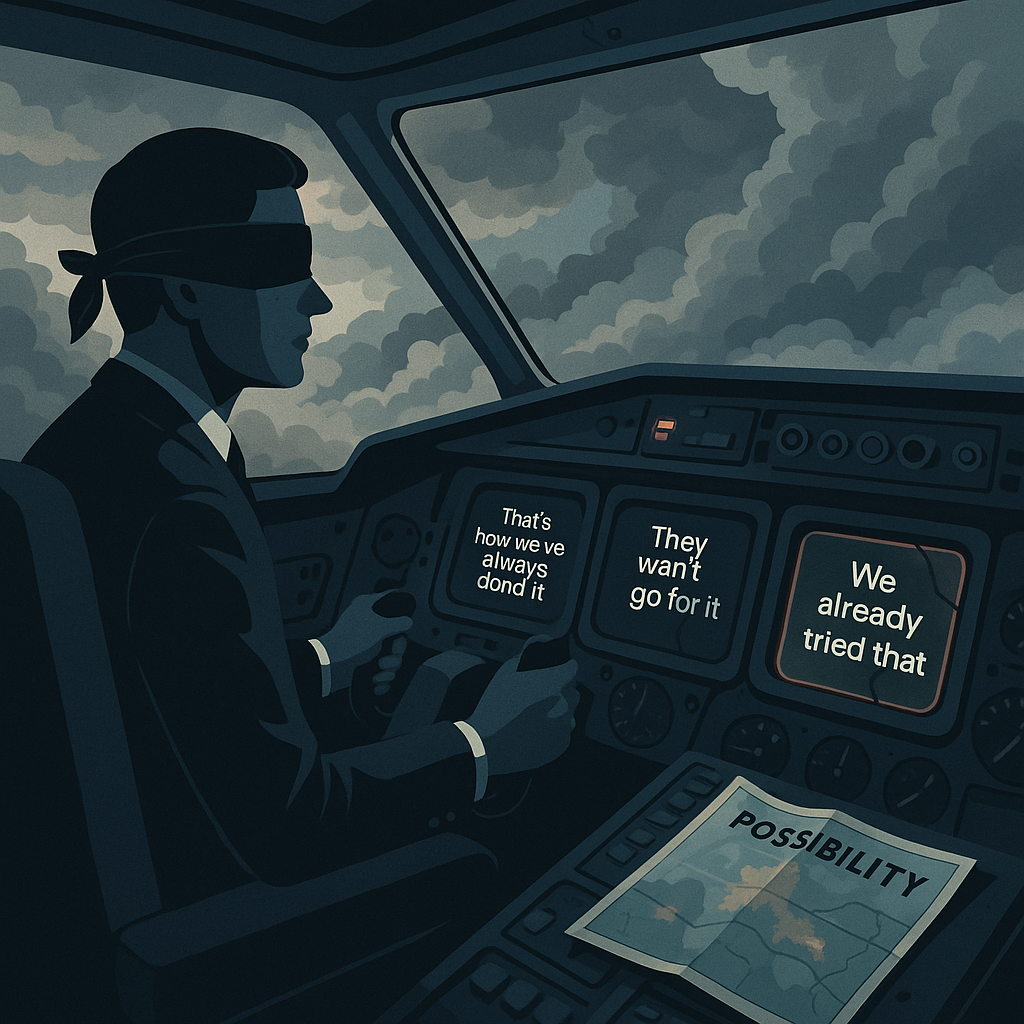Your Brain is Lying to You (and it’s costing you breakthroughs!)
“You must fly the plane.”
That’s the 2025 AICC Chairman’s theme — and it’s exactly what leadership feels like right now. You’ve got priorities,
pressures, and people counting on you. You’re watching your market, your margins, your team. You’re flying
through turbulence, and the instruments keep changing.
But what if the biggest threat to your trajectory isn’t external? What if it’s how your own experience shapes what
you can no longer see?
When Experience Becomes a Blindfold
The Curse of Knowledge is a cognitive bias that happens when we become so familiar with something that we stop
examining it. Once we “know” something, our brains tag it as settled. We make it part of the mental autopilot.
That’s helpful for getting through a busy day. But it’s dangerous in an environment that demands change.
Here’s how it shows up:
∙“That’s how we’ve always done it.”
∙“We already tried that.”
∙“Our customers wouldn’t go for it.”
These aren’t facts. They’re filters — installed by past experience, running quietly in the background. We don’t
notice them because they feel like truth. But the real problem is that we stop questioning them.
The Curse of Knowledge makes it harder to see new solutions, new paths, and new ways to solve the new
challenges you’re facing.
And in a business like yours — where capital investments are big, timelines are long, and the market is in motion —
that can cost you dearly.
From Obstacle Thinking to Possibility Thinking
There’s a different way to lead through uncertainty. And it starts with possibility thinking.
Possibility thinkers don’t assume that the first roadblock is the end of the road. They’re willing to look again. To
question what seems fixed. To ask, “What else could be true?”
This isn’t wishful thinking. It’s disciplined curiosity.
And in industries that are balancing new tech, generational transitions, and growing complexity — curiosity is one
of the most underutilized competitive advantages available.
Here are three practical ways to break out of the Curse of Knowledge and shift from “obstacle” to “opportunity”:
1. Assumption Smashing
Most of what limits your thinking isn’t a real rule. It’s a made-up one. It’s created by your brain based on all your
past experience and expertise.
People absorb assumptions from their own history: what’s worked, what hasn’t, what got praised, what got shut
down. But just because something was true once doesn’t mean it’s true now.
Assumption smashing is the act of surfacing those invisible “rules” and breaking them on purpose.
In innovation sessions, it often takes just one bold move — and it shifts the entire room. Once someone questions
what others were treating as non-negotiable, it unlocks the permission to do the same.
One person’s reframing can become everyone’s breakthrough. As a leader, that person needs to be you. You go first — and show others that it’s not only allowed to question
assumptions, it’s expected.
2. Change the Question
If a team is stuck, the problem might not be the problem. It might be how it’s being defined.
Small changes in language lead to big differences in thinking. Let’s say the goal is to reduce customer churn. It could
be framed as:
∙“How can we retain customers?”
…or:
∙“How can we surprise our customers?”
∙“How might we create something they’d brag about?”
∙“What would make them stay, even if a competitor charged less?”
Each question sends the brain down a different path.
The goal isn’t to wordsmith. It’s to find the frame that leads to fresh possibility.
3. Borrow a Brain
Sometimes teams are simply too close to the problem.
That’s why bringing in someone who doesn’t “know how it works here” can be so powerful. They’re not stuck
inside the same patterns. They don’t carry the same assumptions.
Invite a colleague from another department. Pair up a veteran with a next-gen team member. Ask a new hire what
they see.
Fresh eyes can expose what the Curse of Knowledge has hidden.
You’re Already Flying. Just Don’t Forget to Check the Map.
Pilots check their instruments constantly. They don’t assume. They cross-check. They adjust course when needed.
As a leader, that same discipline matters.
The Curse of Knowledge isn’t a flaw. It’s a cognitive bias — a natural part of how human brains work. But it doesn’t
have to decide what’s possible. It can be challenged — and others can be led to do the same.
You’re already flying the plane.
Now ask yourself:
Are you still headed in the right direction?
The most dangerous limits are rarely external.
They’re the ones that go unquestioned

